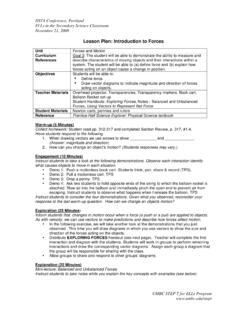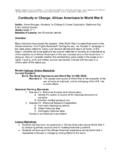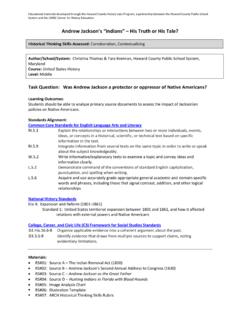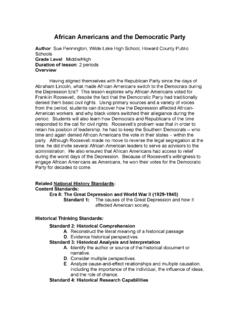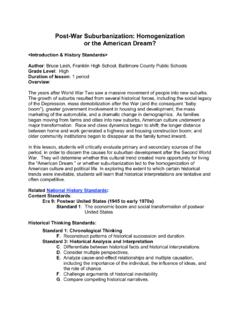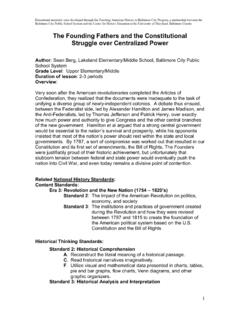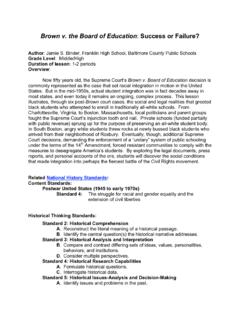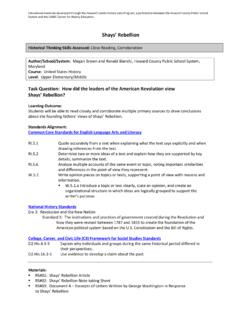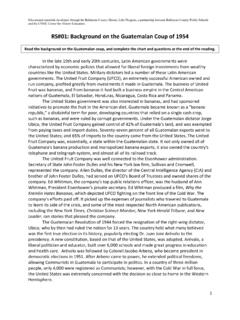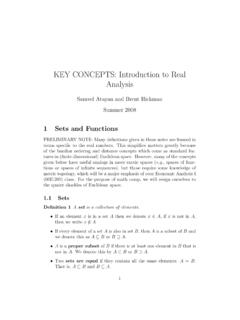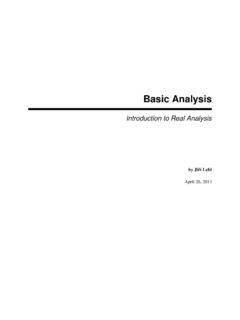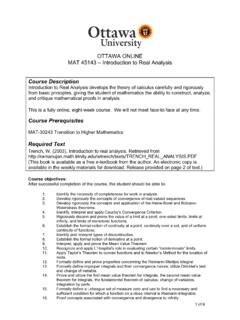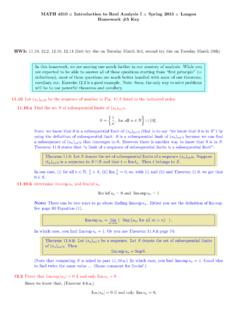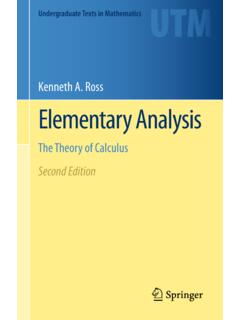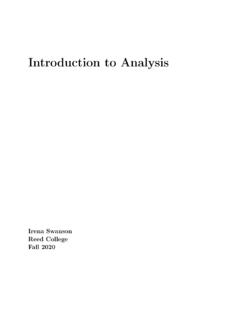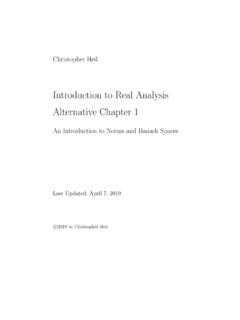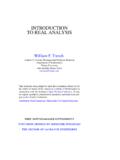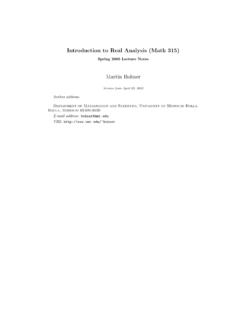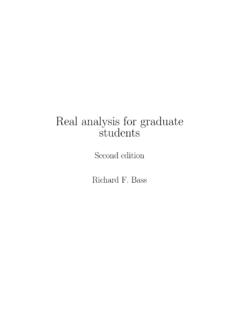Transcription of Math 301-01 (Introduction to Mathematical Analysis I)
1 Math 301-01 ( introduction to Mathematical Analysis I)Summer Session II, 2014 Lecture:MoWeTh 1:00 3:50pm Sherman 006 Instructor:Dr. Kalman M. NanesOffice:Math/Psych 439, phone 410 455 2439 Office hours:TBA, or by G. Bartle and Donald R. Sherbert, introduction to real Analysis , Fourth Edi-tion,Wiley, 2011. As a rough topic order, we will cover Chapters 1 through 6, followed by Chapter11. I may jump around a bit, skip some things, spend extra time on others, and so on. I will attemptto give you ample notice when my perspective differs from the References: Berberian, A First Course in real Analysis Steven Lay, introduction to real Analysis Witold Kosmala, Introductory Mathematical Anaylsis Carol Schumacher, Chapter Zero Strunk and White, The Elements of StyleGrading:The course will be curvedroughlyby the framework: A: 90-100% B: 80-89% C: 65-79% D: 55-64%Your grade will be calculated as follows:Homework Assignments25%Reading Quizzes10%Quizzes20%Exam20%Final Exam25%Learning Objectives:This is the first course in which you are expected to apply rigorousmathematical reasoning in solving problems.
2 That is to say, you will be learning to read and should consider this as much a writing course as a mathematics content will deal with Mathematical logic and grammar; the construction, algebra, andtopology of the real number line; limits of sequences and functions; continuity and differentiability offunctions on the real line; and an introductory look at point-set and Behavior:Attendance is crucial to success in this will becovering new material at a rapid rate, and if you fall behind, it will be very difficult to catch are responsible for making up any missed will not accept late counts as will be no make-ups on quizzes. Make-upexams will be givenat my discretion, in general only in situations where there is a conflict with asanctioned university activityof which I have been notifiedat least a week in advance.
3 Suchactivities may include things like a course conflict or an athletic event. I will excuse a missed examdue to illness only if I am notifiedbefore the exam, and only if you furnish asigned doctor snoteat the earliest available we are all adults here, I expect us to all act like adults and treat each other means that everybody should treat each other with respect in this class. Talking on cell phones,texting, tweeting, playing Starcraft, Warcraft, Minecraft, any other game ending (or not ending)in Craft , browsing Reddit or Tumblr, and other disruptive behavior is not appropriate for theclassroom. Therefore,there will be a ban on cell phones, laptops, earphones, and othermobile devices in class, except in cases where I have given explicit be asked to leave, and will not get credit for any work handed in that be clear: you should expect to spend aminimumof approximately15-20 hours per weekon homework and studyoutside of classfor this am not is an average of3-4 hours per night.
4 That means thatthis course is almost a full-time job. If you do not takethis course seriously from day one, you will simply fail. The time you spend on this course shouldbe roughly equally split between pre-readings and reading quizzes, review of the textbook and coursenotes, and working on homework and practice problems. If you only work on the problem sets thatyou hand in as assignments, and never look at the other practice problems, it is very unlikely thatyou will succeed in this course. This is a hard course. It cannot be crammed for. Good writing takesconsistent practice over a long period of :A list of suggested book problems for each section (to be used as practice) will beposted to Blackboard under Course Documents. I will also post problem sets for you to hand in twicea week, of which there will be10throughout the term (an 11th will be assigned but not collected).
5 Starred problems will be eligible for board work, and you should do your best to complete theseproblems to the best of your ability by the draft day; see below. Each homework assignment will begraded out of 25 points. Your lowest two scores will be dropped, as long as you turn in all assignments that are not turned in will be counted as non-droppable 0 s. Your homeworkscore will be weighted as 25% of your overall grade in the expectations are as follows. First, you should view your homework as a professionalproduct. It should be neat, legible, stapled, named, and free of torn notebook edges. You should nottype up your homework without explicitly consulting me first. Violation of these rules will result inpoints being taken off. Secondly, this is largely a writing class. Therefore, part of your grade willdepend on the quality of your writing.
6 You should use correct grammar and complete sentences, evenwhen that grammar and those sentences are partially or completely Mathematical . You don t need towriteformallywith tortured language and lots of big words; I only expect you to heavily suggest that you form study groups to work on the practice problems and homeworkassignments. Working with others is the best way to learn mathematics (or really, any subject). Beaware, however, that you do need to complete your own write-ups for homework assignments. If Ireceive identical write-ups from different people, I will consider that to be plagiarism, and will pros-ecute you accordingly. To review: discussing concepts and strategies together is fantastic. Checkingyour work together or arguing your proofs with each other is great. Writing your homework togetherword-for-word is very bad.
7 In addition,homework must represent your own efforts. Getting help from sites like Cramster and Chegg will only hinder your ability to do math on your own not to mention that the solutions on these sites are often wrong. If you must refer to other solutionsin order to do your homework, use them as a source of hints and rewrite them in your own Review:Homeworks will be done in two steps. You will begin by bringing in a draft ofyour current homework assignment. This draft should represent a good-faith effort on the requiredproblems. If you are totally stuck, write out what you have been able to finish so far, and exactlywhat you don t understand and are stuck should not be bringing in blank draft should follow all rules outlined two paragraphs above, and in addition, should haveamaximum of one question per page, double-spaced.
8 On days when a draft is due, we willspend some time passing homework assignments around and reviewing each other s willneed a red pen on these job will be to determine whether your peers attempts onthe homework problems accomplish what they are supposed to do. You will comment (in red pen) onmistakes and give hints where necessary. Then you will take the comments that have been given toyou and rewrite your homework to turn in at the next class period. When you turn in your redraftedhomework, the original draft (with peer commentary) should be stapled behind the final help you along with peer reviews, I will answer one question in class about each homeworkproblem, time permitting. I will not answer the question itself - I will only talk about related reviews will be graded on a participation basis. I will be checking to see whether you areputting a good-faith effort on both your rough draft, and your commentary.
9 This participation willcount for 20% of your homework grade. The skills that you are learning through writing commentaryon homework problems will be tested in quizzes and Work:An important aspect of this course is learning how to assess Mathematical draft days, volunteers will present their work on one of the starred homework problems to theclass. Then, the class will analyze the work, determine if it is correct, and help amend it if it is notcorrect. Board work will be graded based on participation and good-faith effort. Each student will berequired to present at least one problem during the term, for 10% of your homework grade. Preferencewill be given to volunteers who have not yet presented a problem during the Quizzes:As we will be using part of our class time for peer reviews, we need to recoupthat time by moving some information exposure outside of the classroom.
10 Therefore, twice a week,you will need to read a couple of sections of material in the text and take a short reading quiz outsideof class. This will allow us to spend our lecture time focusing on tricky bits like problem solvingand difficult proofs, rather than only on basics like statements of definitions and theorems. Readingquizzes will be handed in at the beginning of class on the days that they are due, andshould not bestapled to homework assignments. They will each be graded out of 10 points, and will count for10% of your overall grade. A prospective schedule for material covered on reading quizzes is availablebelow on the Course Calendar. We will adjust this schedule if necessary as we move through Cards:For highly conceptual math courses, knowing and understanding definitions andtheorems as well as possible is crucial.
